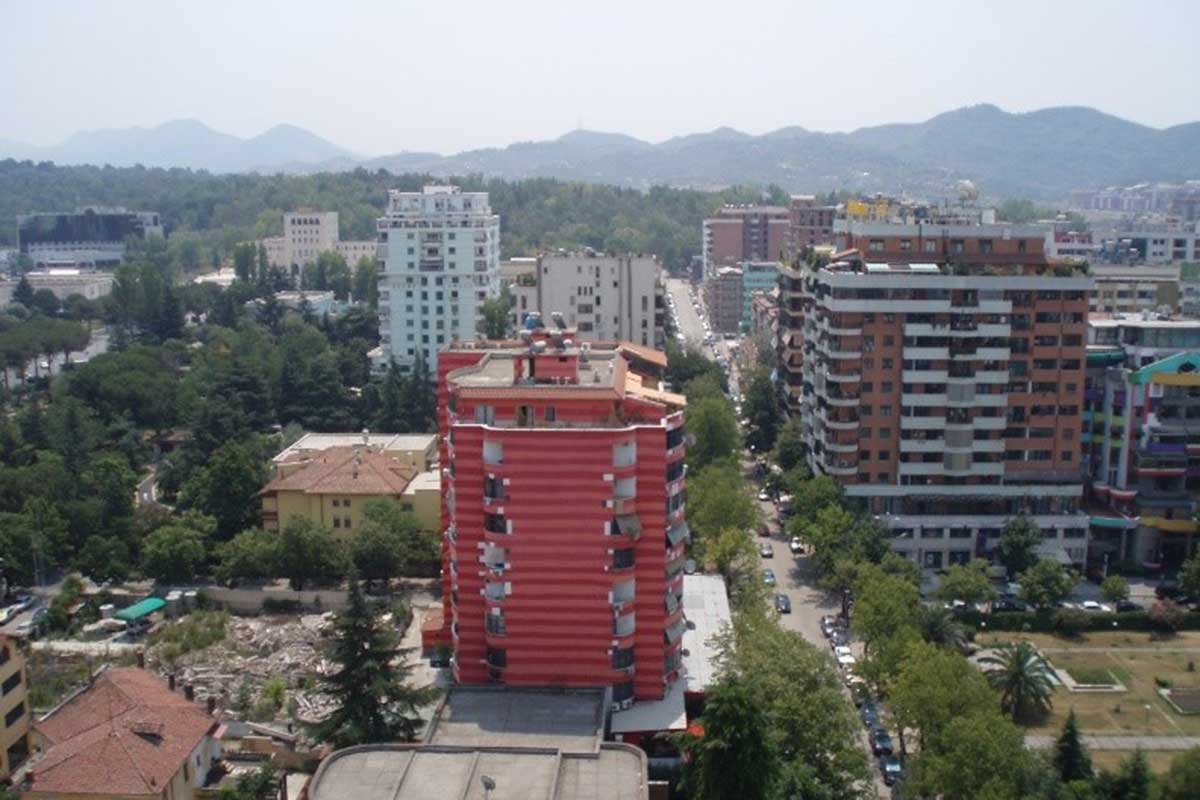This is a system built for decades and needs a totally different approach by everyone, starting from the top. An approach where institutions would start to see public interest above all.
Owning a house in Albania has come somehow to the limits of a dream more than reality. Skyrocketing house prices have made it difficult for families searching for a new roof over their heads to buy one. There is this large gap created by the increasing prices of the real estate industry on the one hand and the very low and insignificant rise in the paycheck that everyone takes every month on the other.
But what is causing this price hike is not any golden rule: when there is demand, the price goes up. Somehow some other developments are bending these rules, and some experts think informal money in the economy is one of them.
The average price in Tirana reaches 1200 euros/square meter
In the Albanian real estate market, the developments have been very dynamic year after year. Construction, mainly in the capital city Tirana, has seen growth, and so have the prices. The purpose of building so much has been mostly for residential use but also mixed-use buildings that also have business activities and offices included. There are some specific projects in the capital where now a square meter has reached 5 000 euros. We are talking about these crazy prices in a country where the average salary is nearly 505 euros.
Of course, these are some selected projects in the most desirable areas in Tirana where the ones who ask to buy a property have money as their last problem. But what is really worrisome is the fact that higher prices are now everywhere around Tirana. Some years ago, you could easily find a home for 600–800-euro square meters. Today the average price in Tirana, according to Keydata Albania (an agency that processes data from property in selling and renting) index is 1200-euro square meters. In only one year, the prices have seen a very high rise, and this was confirmed also by the Bank of Albania in one of the latest publications taking in the analysis of the housing market.
According to the Fischer House Price Index, calculated by the Bank of Albania, the average price of apartments sold during the first half of 2022 has increased by 28.4% compared to the previous six months and by 39% compared to a year ago. This is the highest 6-month increase in the index since 2013 when the Bank of Albania started its calculation.
The salary increase, on the other hand, is far lower than needed to keep up with costs in general. According to INSTAT data, the average salary in the country increased by 7% in the second quarter of 2022. On the other hand, costs due to the increase in the price of food and other products increased by over 6.7%, making the real increase in wages to be only 0.3%.
In a decade, the prices of apartments in Tirana have doubled, making it more difficult to own a house. According to a calculation made lately, the average Albanian needs to work 24 years more than he was supposed to work in 2015 to own a house.
The calculation took in consideration a typical case when someone is looking for a 90 square meter apartment in Tirana. So today he has to pay 105 000 euros to own this apartment. This calculation does not include any other expenses like insurance, tax or furnishing. Someone with an average salary would have to work 64 years to buy this house, considering that 30% of their income goes to cover a loan. For the same apartment, the same person in 2015 with the average salary of that year (around 400 euros, an increase of only 26% from today’s salary) and the market price for that year would have had to work just 40 years to own the house.
This calculation is based on the available income of a family indexed with the inflation rate, the average price of a square meter in Tirana, the time value of money, and the average annual interest rates of loans according to the Bank of Albania.
The “formal” reason behind prices going “crazy”

Source: invest-in-albania.org
As prices go up, construction companies have their own explanation about the phenomena. After COVID-19, the global economy restarted at a higher pace than expected, creating a shortage of raw materials. Also, the energy crisis that started in September 2021 had its own part in this situation, raising the costs of companies even more. The construction sector was not immune. They confirm that the cost of cement, iron, and other materials used in construction has increased by 30-50 percent, but in specific cases, even twice as much.
In such a case, if the construction materials cost more, of course, this will also be reflected in the final price for every property sold. Another reason for the price rises, according to the real estate agents, is the demand. The hunger of Albanians to buy property has been increasing, fueling the price rise too.
But the construction permits have been on the rise too and looks like it has not been possible buffering in any way the sharp rise. According to INSTAT data, in the capital, for the period January - June 2022, construction permits were given for almost 1.2 million square meters, with an increase of 45% compared to the same period a year ago. Those who offer explanations about the rising prices often have their own stake in the situation, but some experts think this is way more than cost and demand can justify.
Is informal money dictating price levels?
The construction sector is classified as one of the main ones who presents a risk of money laundering. According to the yearly reports of General Directorate for the Prevention of Money Laundering in Albania, construction is found in some typologies used by people who want to legalize their informal money and put it to use in the economy.
But today no one can tell how much of this informal money is invested and deforms the price and market. Experts think that at one stage Albania can face a bubble in the construction sector.
The artificial high prices serve only to some people who are using the mechanism of buying to legalize their money and artificially impacting the market. Officially authorities in Albania never have accepted that the price levels are impacted in any way by illegal money, but this doesn’t mean that deformity and the risk on economy isn't present.
The International Monetary Fund in the last mission in Albania underlined something very important and the message there is strong about what is going on in construction and real estate. “We welcome the BoA’s efforts to address significant data gaps on real estate and construction and call for enhanced surveillance of this sector’s impact on financial stability”-was the message. If you read between the line’s things are clear that the IMF also sees a risk on what is going on right now.
Another report from the Global Initiative against Transnational Organized Crime published last year underlined that funds obtained mainly from the international drug trade are used in the construction and tourism sector in Albania. The European Commission also last year in a report underlined the fact that Albania must do more to prevent money laundering. The voices of experts and economists who agree that developments in real estate and construction are somehow deformed from normal rules are rising day by day.
Of course, this situation does not include all of the construction sector, where you can find companies with a long history of business and a good name on the market that for sure struggle to survive in an unfair situation.
Who is paying the cost of institutional blindness
It is part of the family mentality in Albania and Balkan in general, to buy and have a house. But, with the new pricing level, the picture we have today is that the average Albanian has to struggle all his life and maybe succeeds in buying a house. The one who is at the surviving limit, can just have one of his dreams while multimillionaires seem to buy more than one, but the numbers don’t match reality. In this case the question is: Who is buying and what is making prices go sky-high?
The answer is not that simple. You have to check a chain of developments to find the truth and the institutions look like they have a lack of will for this for some reasons. First you have to have independent institutions and this is something that remains just a dream in Albania. If everyone had the social responsibility to do his job correctly, the link between politics and business would be cut directly and the corruption would be severed.
But this is not something that can be done by one person. This is a system built for decades and needs a totally different approach by everyone, starting from the top. An approach where institutions would start to see public interest above all.
No one is saying the government has to steer the market. But surely it can protect the citizens from deformed markets and prices impacted by illegal financing, if there is any. To know this, you have to work to prove it. Albania has invested at first 110 million euros for what is called Justice Reform. From 2016 when everything was approved till today the results are underwhelming.
At the beginning of 2021 SPAK (Special Anti-Corruption and Organized Crime Structure) one of the main institutions that came out of Justice Reform started an investigation about money laundering in construction but still there is no result made public. The judicial reform is still ongoing and during 2022 the Albanian Parliament voted to extend it since the mandate of people who are now part of the new institutions expires this year.
Offering a fair competition environment and rule of law always pays back by saving the citizens from the costs that don’t belong to them. It is not that difficult to solve this dilemma, the government just has to “Follow the Money”.
Please refer to the Terms before commenting and republishing the content. Note: The views and opinions expressed in this article are those of the author and do not necessarily reflect the views of the Institute of Communication Studies or the donor.


